Spain is a country divided by its regional languages and accents. Indeed, it was not until Fernando de Aragon and Isabel de Castilla "jumped the broom" and effectively united t country, what we now know as Spain was a collection of separate kingdoms and states, with their own languages, dialects and accents.
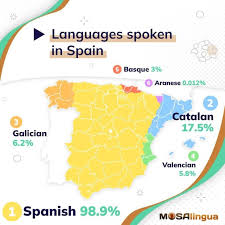 Nowadays, post-Franco Spain has six official languages.
Nowadays, post-Franco Spain has six official languages.
They are: castellano (Castilian Spanish); asturiano; catalan; euskera (Basque); gallego; and valenciano.
The rest, such as andaluz, extremeño and murciano,. are merely dialects or accents.
Languages Map of Spain [courtesy of MosaLingua]
Is Spain divided?
 There are separatist tendencies in some areas, mainly Cataluña and the Basque Country. The strongest movement is in Cataluña, of which Spain's second city Barcelona is the capital, although the Basques have long desired independence especially in the late 20th Century when the ETA terrorist movement was effectively at war with Spain (think IRA in Ireland).
There are separatist tendencies in some areas, mainly Cataluña and the Basque Country. The strongest movement is in Cataluña, of which Spain's second city Barcelona is the capital, although the Basques have long desired independence especially in the late 20th Century when the ETA terrorist movement was effectively at war with Spain (think IRA in Ireland).
[Photo: Grupo Prisa]
However, the Spanish central government has no desire to go down the independence route. In fact, it is unconstitutional. Plus opinion polls show that most Catalans are happy to remain as part of Spain.
As for rivalry between different regions, that's another matter. Andaluces hate Basques, Catalans and madrileños; Basques are aloof; Catalans hate everybody else; and the rest aren't bothered.

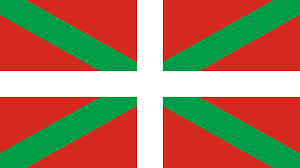
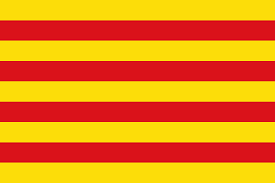
Flags of Andalucia, Pais Vasco and Cataluña all courtesy of Wikipedia
What about other countries?
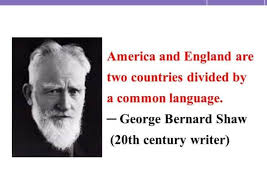 They say that the USA and England/the UK are two countries divided by the same language.
They say that the USA and England/the UK are two countries divided by the same language.
To some extent that's true: trunk v boot (automobile/car); hood v bonnet (ditto); john v toilet/wc; movie v film and so it goes on.
In such a big country there is also a wide range of accents.
The national languages spoken in the USA are English, Spanish and French. The Amish community speak a form of German.
[Courtesy of The Sheffield Star newspaper]
All countries have their regional accents. In the UK Glaswegians are unintelligible to most other speakers of English from other areas, especially "darn sarf" (down south).
Many English southerners have problems with "scouse", "geordie" and the Welsh and Northern Ireland accents. The reverse also applies. My pal at university, Mel from Belfast (NI), spent a week with me and my family in Devon, back in the 1970s, and he didn't understand a word the entire time, he told me afterwards.
In Germany I defy a Hochdeutschsprecher from Hanover to understand a fellow German from Baden-Wuerttemberg where Badisch and Schwabisch rule. As for a fluent German-speaker like I am, well, no chance!
The Bavarian accent is also demanding, but if you cross the southern border into Austria or Switzerland, forget it! Swiss German (Switzerdeutsch) is not generally understood by most Germans, and the Austrian accent also presents its challenges (cf. Adolf Hitler's speeches at rallies in the run-up to World War II).
In my own case, an honours graduate in German and Spanish, I ended up in later life living in Andalucia married to a German lady from Lippe (North Rhine Westphalia). Most of her family live in Baden-Wuerttemberg and we visit frequently. To begin with whenever we were there I couldn't understand a word!!!
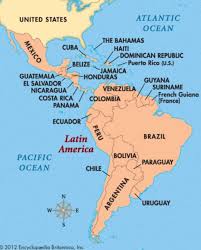 There is a wide range of different accents in Central and South America.
There is a wide range of different accents in Central and South America.
In many countries of the region, such as Argentina, Mexico, Paraguay and Uruguay, the castellano spoken by the conquistadores has largely survived albeit in an antiquated form.
In other countries the Spanish has been influenced greatly by the indigenous languages of the indios (original inhabitants).
Chile, Colombia, Ecuador, and Peru, for example, speak a form of Spanish which is remarkably different from the castellano of 500 years ago.
[Map courtesy of Pinterest]
Endword
Because the dominant and most successful colonialists of the 15th and 16th centuries were the English and the Spanish, if you speak both English and Spanish well, you can get by in most of the world. French, Dutch and German also help in certain areas where they acquired colonies, but less so.
On a personal level, with my German and Spanish plus French to A-Level, I can get by in most of the world.
I would struggle in China, North Korea and Russia, but I have no intention of visiting any of those places anytime soon. I am linguistically content.
When all is said and done, we're all human beings and if we wish to communicate with speakers of other languages, we manage, don't we?
As Rita my German wife says "mit Handen und Fussen" (lit. with hands and feet, ie by the use of gestures).
[Image courtesy of Amazon.de]
© don Pablo
Photos and images:
Amazon.de, Grupo Prisa, MosaLingua, Pinterest, Sheffield Star
Acknowledgements:
don Pablo, Paul Whitelock, Wikipedia
Tags:
Amazon.de, don Pablo, Grupo Prisa, MosaLingua, Paul Whitelock, Pinterest, Sheffield Star, Wikipedia